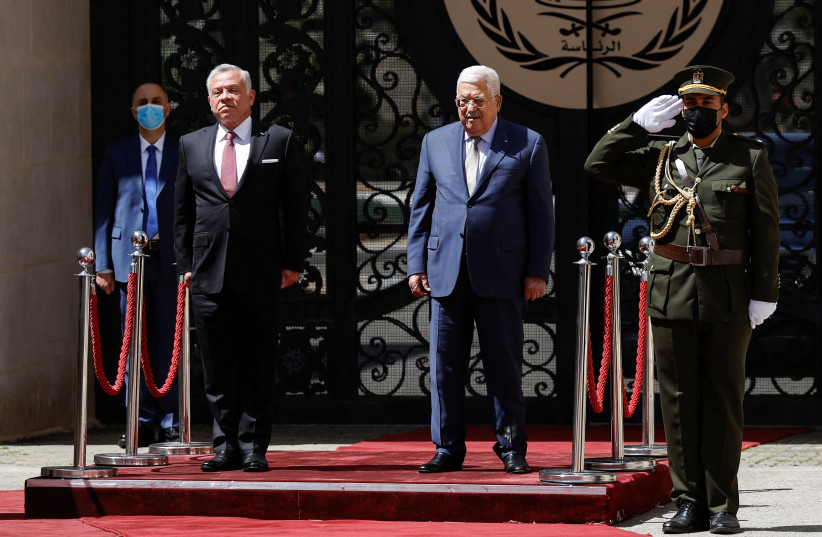The optics were unmistakable although the content remained unclear: Helicopters belonging to the Royal Jordanian army flew into Ramallah, seat of Palestinian Authority’s Muqata government headquarters, and whisked away PA President Mahmoud Abbas and his top aides. In less than two hours the same helicopters were back in Ramallah, returning the Palestinian officials.
For more stories from The Media Line go to themedialine.org
The official Palestinian news agency Wafa had little to say about the meeting: “Palestinian President Mahmoud Abbas returned after a visit to Jordan where he met with his brother King Abdullah II.” No other details were published at first.
Jordan’s news agency Petra, however, appeared to give away the real reason behind the extremely short meeting. “His Majesty expressed continued concern about coordination with Arab brothers to support the Palestinian cause, stressing the need to include fellow Palestinians in the regional projects, empowering them and making sure that they are not marginalized,” it reported.
Najeeb Qadoumi, an Amman-based member of the Palestine National Council, told The Media Line that the key word is marginalized. “I think if you look at the interview the king gave today you will notice that he placed special emphasis on the issue of the Palestinians being marginalized,” he said. Qadoumi was referring to the fact that Abbas was not invited to the GCC+3 summit that took place in the Saudi port city of Jeddah earlier this month.
In an extensive interview with Jordan’s newspaper of record, Al Rai, on Sunday, the king devoted an entire paragraph to the issue of the efforts to marginalize the Palestinians in answer to a question about whether economic empowerment is aiming to replace political efforts.

Remarks by King Abdullah
“The economic side is important, and Palestinians have a human right to live in dignity, but economic development cannot be achieved without a political solution to the conflict,” King Abdullah said.
“We are open to cooperation across all fields, and always insist that our Palestinian brothers and sisters are part of regional projects. We are closest to the Palestinian people, and we want them to have a share in all regional development projects. We will not accept marginalizing them in any way, as they are facing difficult economic challenges. Our efforts in the coming days and weeks are focused on reaching out to all stakeholders to create an environment conducive to resuming the peace process between the Palestinians and the Israelis,” he also said.
A senior Jordanian journalist, who asked not to be identified, told The Media Line that the meeting shows that Jordan wants to remain relevant. “While the meeting was officially billed as an update on the Jeddah meetings, nothing of importance happened. Jordan simply wants to remain relevant,” the journalist said
Jordanian media did make passing mention of a topic that has been the recent focus of public opinion, namely the huge overcrowding at the King Hussein Bridge. The bridge is the only artery connecting the West Bank to Jordan and the rest of the world. In recent days, visuals of thousands of stranded Palestinians and their visitors have been published by regular news outlets as well as on social media.
Jordanian officials, including the interior minister, who visited the bridge, blame Israel for the overcrowded situation because of Israel’s refusal to extend the opening hours of the bridge during the hot summer days. The situation has been exacerbated by the return of thousands of Palestinian pilgrims to Mecca and to the post-COVID rush for families and friends to make visits to the Palestinian territories.
Some media outlets have said that the problem has been permutated by Israel on purpose in order to force Palestinians to accept the offer to fly in to the barely used Ramon Airport, which is a four-hour drive from Ramallah. Palestinian officials have denied that the airport offer was made during the recent meeting between Israeli Defense Minister Benny Gantz and Abbas, but there are reports that the first trip carrying Palestinians to Istanbul will be made from the airport near Eilat. So far there are no details on whether the Palestinians will be from the West Bank only or if Palestinians from Gaza also will be able to use the Ramon Airport.
